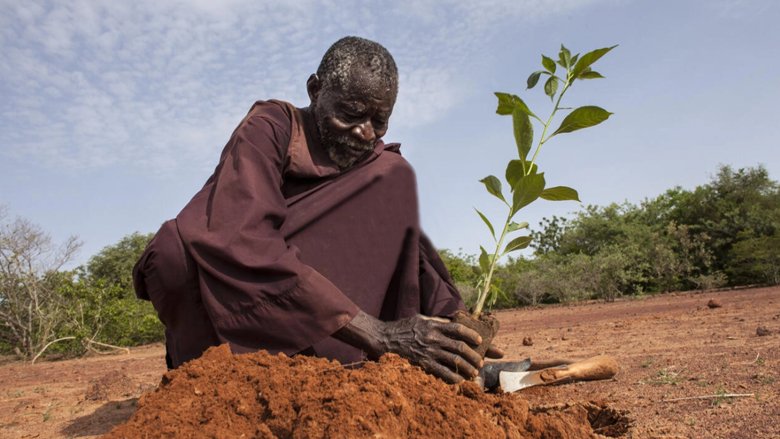As food systems in the Sahel and West Africa face exceptional stress, there is also a growing demand for more climate-smart investments to support countries where communities face the compounded effects of climate change, conflict, and unprecedented environmental degradation.
The African-led Great Green Wall is a major regional initiative that promises such climate-smart solutions to transform both the region’s economies and ecosystems. By 2030, it seeks to restore some 100 million hectares of degraded land and generate 10 million jobs in rural areas, supporting people’s ability to respond and adapt to climate risks. The World Bank has committed to invest $5.6 billion between 2020 and 2025 in 11 countries taking part. Over 60 projects are focused on transforming livelihoods in the Great Green Wall through landscape restoration, improved food systems, and access to climate-resilient infrastructure.
Tangible results
“Before, I used chemical fertiliser every year and I could go through 20 or 30 bags of it,” says farmer Nama Boureima in Sapouy, Burkina Faso, one of hundreds benefiting from biodigesters installed in the country.
By adding a mix of cow manure and water to biodigesters, farmers can generate renewable biogas for cooking and organic fertiliser for their fields. This reduces CO2 emissions by capturing methane emitted by the manure, while lowering pressure on forest resources previously used for household fuel.
“Now I don't worry anymore about the fertiliser problem,” Boureima says.
His farm illustrates some of the sweeping changes in progress under the Great Green Wall. Some 270,000 hectares of land have been brought under sustainable management in Burkina Faso; more than 2,500 micro-projects have been financed; 1.5 million people have seen their monetary benefits from forest products increase; and 10 million tons of CO2 have been reduced or avoided.
About 12.5 million people benefited from the US$900 million Nigeria Erosion and Watershed Project (NEWMAP) that reinforced the country’s ability to fight erosion, natural hazards and disasters, while creating 20,000 direct and 32,000 indirect jobs through Sovereign Green Bonds — a first for Africa.
In Niger, additional yields of as much as 58% have been achieved by agro-sylvo-pastoral communities thanks to training on climate-smart strategies.
Green future
As global food security challenges mount, tapping the potential of these ambitious climate-smart investments is seen as essential for making the region’s economy more resilient, achieving inclusive growth, and combating food insecurity.
“When these elements are put together, not only does it transform the economy, but jobs are created too. That allows young Africans to stay in Africa and make a living from their work by being in Africa,” says the World Bank’s Diagana.

